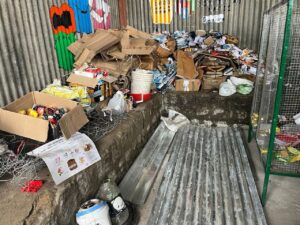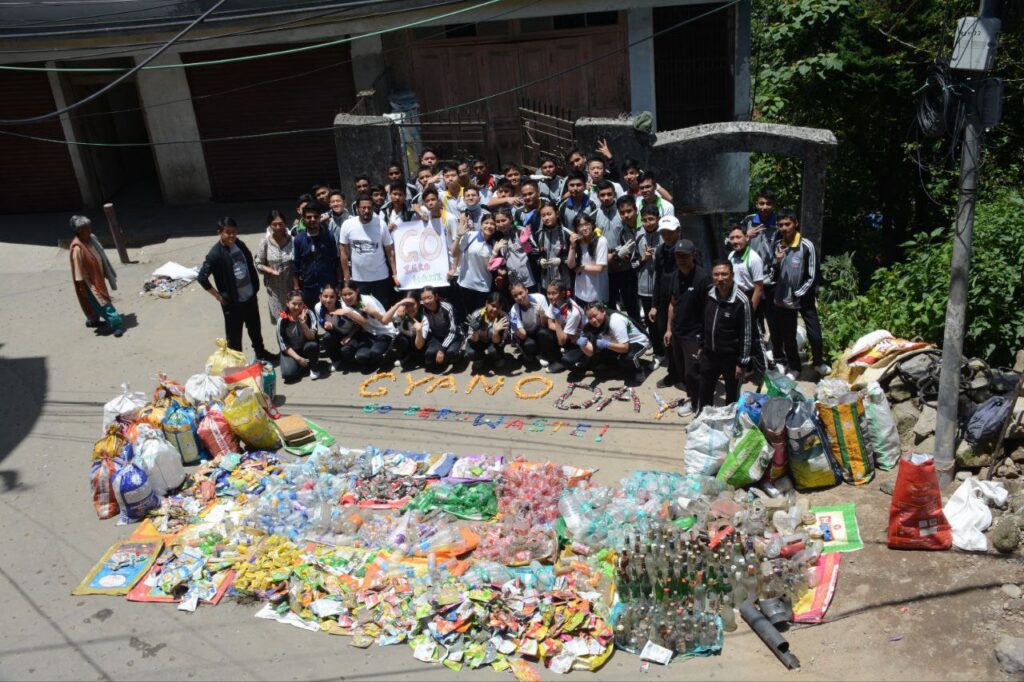Companies take responsibility of your waste, calls out The Himalayan Cleanup
– Prabin Rai
Gangtok 24 June:
The results of the top polluting companies of the Himalaya are out. The data comes from the effort of 11000 volunteers across 10 mountain states who cleaned up over 350 sites, segregated and conducted waste and brand audits. The total number of waste picked up by volunteers was 117,187, of which 108,799 were plastic (92.8%) from 63 sites. 77.1% of all plastic collected was non-recyclable, mainly multilayered plastics and tetra pak.

The Himalayan Cleanup 2023 (THC) brand audit revealed that these plastic packaged products are from PepsiCo India; Perfetti Van Melle; Parle; CG Foods India Pvt. Ltd.; ITC, Hindustan Coca Cola; Nestle; Tej Ram Dharam Pal Pvt. Ltd.; Mondelez India Food Pvt. Ltd.; GCMMF(Amul); Hindustan Unilever Ltd.; Britannia Industries Ltd.; Trimurti Fragrances; Guptaji Food Products; Vadilal Enterprises; Dabur India Ltd; Zeenat Ice Cream, Paras Surti Product Pvt Ltd., Godfrey Phillips, Haldiram’s Snacks Pvt. Ltd. making them the top 20 companies polluting the Indian Himalayan Region.
For far too long, the burden of cleaning up has been seen as a responsibility of consumers and waste managers alone, while the producers of waste – the companies who create the waste have shirked theirs. It is now imperative that companies take responsibility for their waste and design out waste at a systemic level. Naming these companies that are the top polluters is the narrative shift required to redress the Himalayan waste crisis.

The Himalayan Cleanup is an annual event started in 2018 and is undertaken across the Indian Himalayan Region anchored by Integrated Mountain Initiative and Zero Waste Himalaya to highlight the waste crisis in the Himalaya and advocate for mountain sensitive policies and practices. ‘Reflect, Switch and Demand’, the theme for THC conducted between 26 to 30 May each year motivates participants to reflect on their contribution and responsibility to the waste crisis; switch to sustainable lifestyles and raise collective voices against plastic pollution. THC movement is grounded on the principle that waste results from design flaws, and that producers taking responsibility for their products and their waste is of utmost necessity to resolve the plastic waste crisis.
Mountains are flooded with non- recyclable plastics, that have no solutions and are not collected by any waste pickers and scrap dealers, and are found littering mountain landscapes, choking waterways, and filling up landfill sites. The scourge for waste managers, these kinds of plastics are the main reason why mountains are burdened with a huge waste crisis.

The food and waste intersect also emerged clearly from the THC data, with packaged food and drinks making an alarming 81.8% of all plastic waste collected. This intersection has become extremely apparent looking at data since THC was conceptualised in 2018. It is an indication of the junk and processed food culture that is overtaking the diverse local food cultures of the Himalaya. These foods low in nutritional value and high in salt, sugar and fat contribute to the fast growing non-communicable lifestyle diseases in the Himalaya. Even before the packaging is trashed it is already a threat to the wellbeing of communities. 73% of food packaging was non-recyclable multilayered plastics showing how a change in eating habits is contributing to the waste crisis.
The surge in Sting, an energy drink from 11% in 2022 to 22% this year is particularly frightening, given the warning label on the product that it is “not recommended for children, pregnant or lactating mothers”. A dip in single use plastic from 7.4% to 2.3% has also been recorded from 2022 data.

The journey of THC 2023 from 2018 shows the unabated onslaught of plastic waste in the Himalaya and the need for urgent, emergency response to the crisis at the individual and institutional levels. It calls on individual action to reduce waste and move to mindful consumption. Intersecting issues of food and nutrition security and the climate crisis in the waste management narrative is critical for sustainable solutions.
Waste management is a challenging task in the mountains and this needs to be acknowledged with adequate resource allocation and mountain sensitive policies. THC demands companies to stop polluting the Himalaya.




